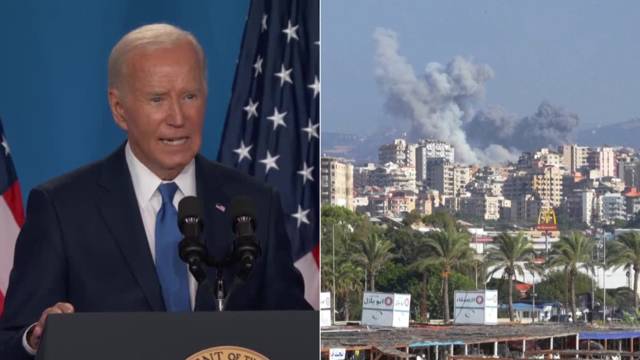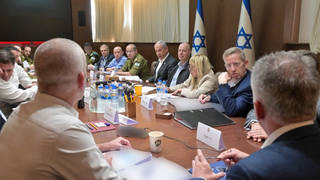
By Amy Goodman & Denis Moynihan
While world leaders gather in New York for the United Nations General Assembly, Israel ramps up its assault on Lebanon, killing hundreds of civilians and forcibly displacing an estimated half million people as it prepares for a likely ground invasion. One world leader after another takes the podium at the UN, accusing Israel of genocide in Gaza, putting in stark relief the impunity Israel receives thanks to diplomatic cover and military support from the United States.
President Joe Biden offered lip service to a diplomatic solution in Lebanon, issuing a joint statement with French President Emmanuel Macron calling “for a temporary ceasefire to give diplomacy a chance…The statement we have negotiated is now endorsed by the United States, Australia, Canada, European Union, France, Germany, Italy, Japan, Saudi Arabia, United Arab Emirates, the United Kingdom, and Qatar.”
Israeli Foreign Minister Israel Katz promptly responded on social media, “There will be no ceasefire in the north,” as Prime Minister Benjamin Netanyahu traveled to New York to address the General Assembly.
If Biden wants a ceasefire, he could begin by halting arms shipments to Israel.
“Nobody really has any hope in these processes in the United Nations, in the words of the Biden administration, or in the words also of the Netanyahu government,” Lara Bitar said on the Democracy Now! news hour, speaking from Beirut. She is the editor-in-chief of The Public Source, a Beirut-based independent media organization.
Bitar shared observations from one of her reporters in southern Lebanon:
“People are very, very tired. They’re unable to sleep for longer than a few minutes at a time because of the relentless bombardment by Israel. The shelters are full with elderly people who have lived through so many massacres and witnessed so much horror inflicted by the Israeli settler colony. One woman, in her 80s, was wearing her house key as a pendant. She told him that this is nothing in comparison to what they have lived through over the past few decades, the 1982 Israeli invasion of Beirut, the first Qana massacre in 1996, the second Qana massacre in 2006…for a lot of these people who have been displaced from their homes, whose homes have been destroyed, their attachment to their land only grows stronger.”
Israel says it is only trying to allow its displaced citizens to return to their homes in northern Israel, by ejecting Hezbollah, the main military force in southern Lebanon. Israel and Hezbollah have been trading fire over the border since October of last year. Hezbollah says its attacks are in solidarity with the people of Gaza, and will continue for as long as Israel bombards the Gaza Strip.
Last week, a shocking attack on Lebanon occurred when thousands of pagers exploded simultaneously, followed the next day by the explosions of walkie-talkies. Israel is believed to be behind the attack, presumably targeting Hezbollah operatives. But the explosions were indiscriminate. Overall, 42 people were killed in the attacks, including children and civilians, and an estimated 3,500 were injured and maimed.
UN High Commissioner for Human Rights Volker Turk told the Security Council, “International humanitarian law prohibits the use of booby-trap devices in the form of apparently harmless portable objects…It is a war crime to commit violence intended to spread terror among civilians.” Even former US CIA Director and former Secretary of Defense Leon Panetta called it “terrorism.”
Then, last Monday, Israel launched a massive bombing attack on Lebanon. Hospitals, ambulances and schools are reportedly among the locations hit. So far, at least 650 people have been killed.
“In a single day, on Monday, more than 500 people were killed. It is one of the highest daily death tolls in recent global wars. It is higher than most daily death tolls in Gaza in the past year,” Aya Majzoub, Amnesty International’s deputy director for the Middle East and North Africa, said on Democracy Now! from Beirut. “In 2006, the 33-day war that took place between Hezbollah and Israel resulted in 1,100 deaths over 33 days. We’ve already achieved half of that in just 24 hours. So the numbers are really unprecedented.”
Lebanon hosts the most refugees per capita in the world, with 1.5 million Syrians and over 250,000 Palestinians. Its economy has been battered by war, political division, and a devastating port explosion in 2020. Meanwhile, since the 2006 war, Hezbollah has only grown in strength, gaining combat experience in Syria and building an estimated stockpile of 200,000 missiles.
“Hell is breaking loose in Lebanon,” U.N. Secretary-General António Gutteres implored world leaders gathered at the General Assembly. “The people of Lebanon, as well as the people of Israel and the people of the world, cannot afford Lebanon to become another Gaza.”











Media Options